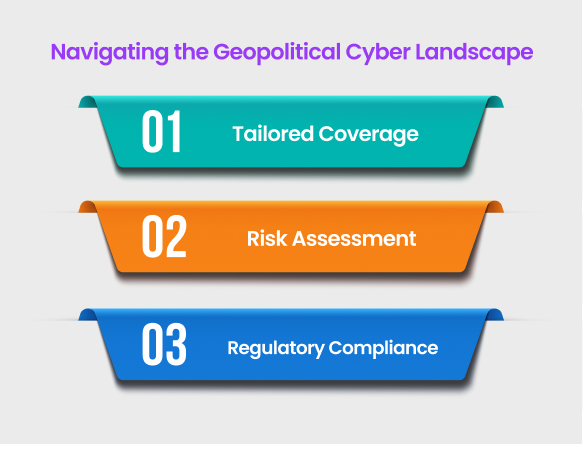Changing geopolitical situations cannot affect cybersecurity, right? Wrong! A changing geopolitical landscape can indeed lead to potential cyberattacks. Recent India-Maldives tensions, fueled by geopolitical shifts, raise the risk of cyber threats. This blog explores their potential impact on cybersecurity, emphasizing the urgency of proactive measures like adoption of cyber insurance.
The Intersection of Geopolitics and Cybersecurity:
In an era marked by heightened geopolitical tensions, the digital landscape has become a battleground for strategic advantage. As nation-states and non-state actors engage in cyber espionage, proxy warfare, and disinformation campaigns, the need for robust cybersecurity measures has never been more critical.
The Impact of Geopolitical Tensions on Cyber Insurance:
The evolving geopolitical landscape has direct implications for cyber insurance. Businesses operating in regions or industries prone to cyber threats must reassess their risk profiles and insurance needs. As cyberattacks grow more sophisticated, traditional insurance may fall short. Tailored cyber insurance is essential for specific risks and threat environments
Mitigating Risks through Cyber Insurance:
Smart cyber insurance strategies can help businesses mitigate risks associated with geopolitical tensions and cyber threats. By getting cyber insurers comprehensive coverage and proactive risk management solutions, businesses can enhance their cyber resilience and protect themselves from financial losses resulting from cyber incidents.
Navigating the Geopolitical Cyber Landscape
Businesses should work with insurers to develop robust incident response plans that outline clear protocols for detecting, containing, and recovering from cyber incidents. This proactive approach can minimize the impact of cyberattacks and facilitate a swift recovery.

Tailored Coverage:
Cyber insurance policies should be tailored to address specific risks arising from geopolitical tensions, such as state-sponsored cyber operations or proxy warfare. This may encompass coverage for business interruption, data breaches, and regulatory fines resulting from cyber incidents.
Risk Assessment:
Regular risk assessments in collaboration with insurers can help businesses identify potential vulnerabilities and priorities cybersecurity investments. This proactive approach enables businesses to stay ahead of emerging threats and strengthen their cyber defenses.
Regulatory Compliance:
Cyber insurance policies should align with relevant regulatory requirements, especially in industries with stringent data protection regulations. This ensures that businesses remain compliant and avoid costly penalties resulting from non-compliance.
Looking Ahead
Potential Impact of Recent India-Maldives Tensions on Cybersecurity The recent geopolitical tensions between India and the Maldives, stemming from the former’s concerns over Chinese influence in the island nation, could have a range of potential implications for the cybersecurity space in both countries and the broader region.
Increased Cyber Attacks:
Targeted Attacks: State-sponsored or hacktivist groups from either side could launch cyberattacks against critical infrastructure, government systems, and private businesses in the other country. This could involve data breaches, denial-of-service attacks, or manipulation of critical systems.
Spying:
Both countries might intensify cyber spying efforts to gather intelligence on each other’s military capabilities, diplomatic strategies, and internal affairs. This could lead to compromised sensitive information and potential leaks.
Disinformation Campaigns:
Malicious actors could utilize social media and online platforms to spread misinformation and propaganda, aiming to sow discord and manipulate public opinion in both countries.
Heightened Cybersecurity Measures:
Increased Security Spending: Both India and the Maldives are likely to increase their cybersecurity budgets to bolster defenses against potential cyberattacks. This could involve investments in improved infrastructure, security software, and personnel training.
Stricter Regulations:
Governments on both sides might introduce stricter regulations on cyberspace, potentially including data localization requirements, content filtering, and increased surveillance. This could raise concerns about online freedom and privacy.
International Cooperation:
The recent tensions could prompt India and the Maldives to strengthen their cybersecurity cooperation with other countries, sharing threat intelligence and coordinating response measures. This could enhance the overall capability to counter cyberattacks.
Regional Impact:
Wider Geopolitical Landscape: The India-Maldives tensions could contribute to a more unstable geopolitical environment in the Indian Ocean region, making it a potential target for cyberattacks from other actors.
Impact on Other Countries:
Other countries in the region, particularly those with close ties to both India and the Maldives, could be caught in the crossfire of cyberattacks or disinformation campaigns. This could further destabilase the region and complicate international relations.
Last Words
In conclusion, the recent tensions between India and the Maldives highlight the growing importance of cybersecurity in international relations. Both countries need to take proactive measures to strengthen their defense’s, foster international cooperation, and prevent cyberattacks from escalating into real-world conflict.
The best way to mitigate the risk of a potential cyberattack due to the changing geopolitical environment between Maldives and India is by getting cyber insurance from Mitigata.
We at Mitigata, specialize in mitigating the risk of cyberattacks, offering comprehensive coverage and proactive risk management solutions to safeguard your business in this ever-changing cyber landscape.




